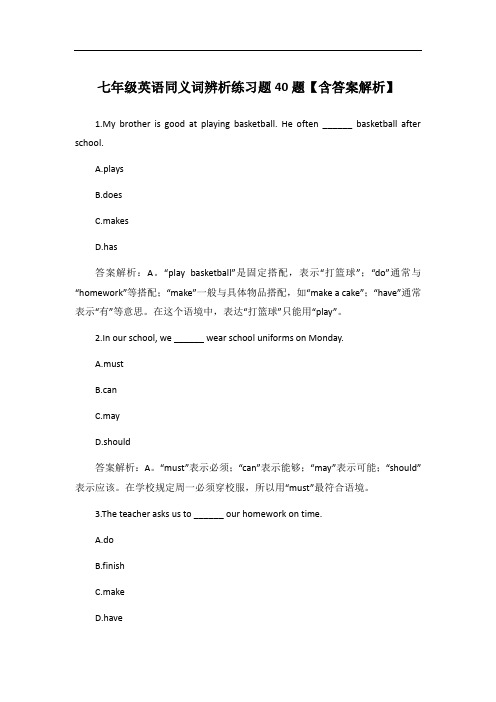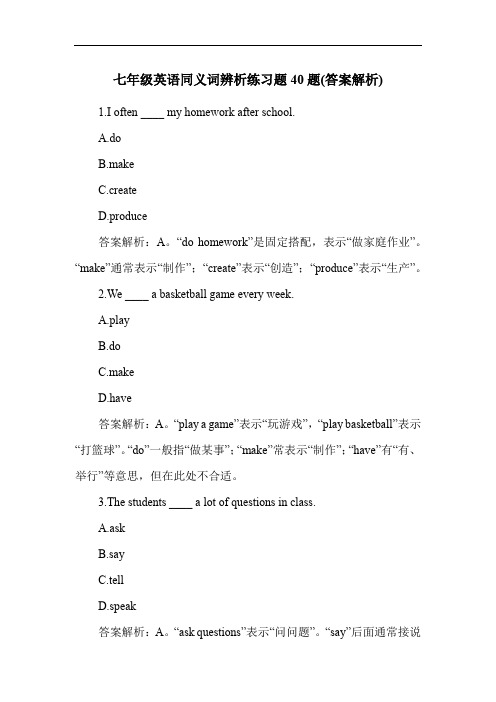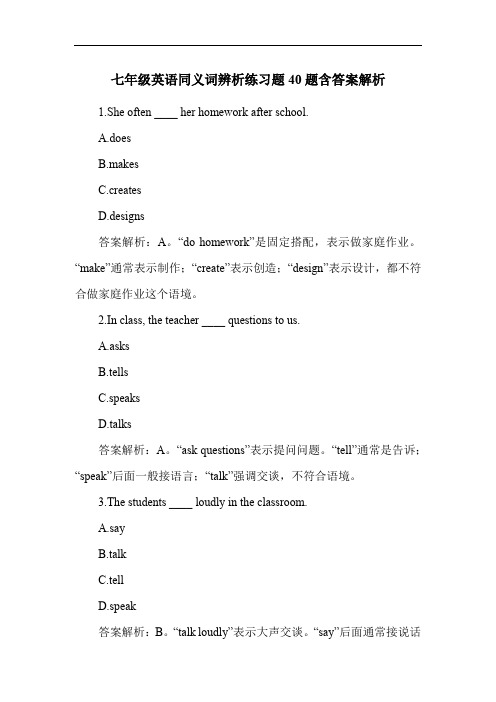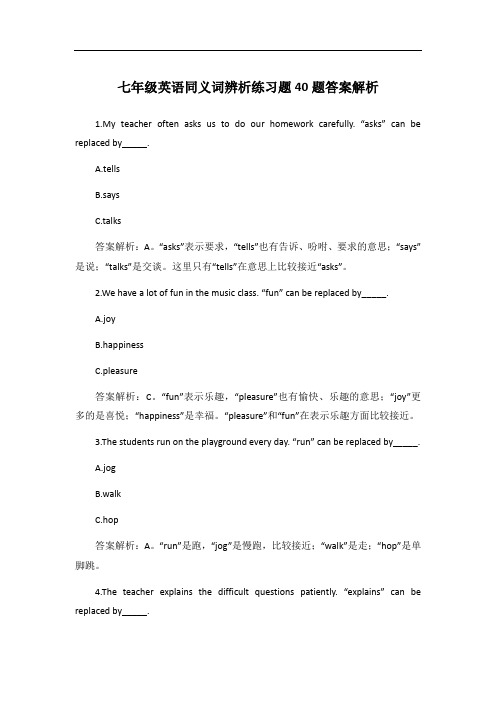中考英语常见20组词语辨析七年级英语同义词练习
中考英语同义词扩展辨析练习题40题带答案

中考英语同义词扩展辨析练习题40题带答案1.She often ______ her room on weekends.A.cleansB.washesC.makesD.does答案解析:A。
“clean”表示打扫,通常用于打扫房间等场所;“wash”主要是洗,一般用于洗衣服等;“make”有制作、整理床铺等意思,不常用于打扫房间;“do”比较宽泛,可以表示做各种事情,但在这里没有“clean”具体地表示打扫房间准确。
2.He ______ his homework carefully every day.A.doesB.makesC.createsD.writes答案解析:A。
“do homework”是固定搭配,表示做家庭作业;“make”主要是制作,不能用于做家庭作业;“create”是创造,也不合适;“write”主要是写,不能完全等同于做家庭作业。
3.They ______ basketball after school.A.playB.doC.makeD.have答案解析:A。
“play basketball”是固定搭配,表示打篮球;“do”主要用于做事情,不能用于打篮球;“make”是制作,不合适;“have”有多种意思,但在这里不用于打篮球。
4.She ______ a letter to her friend last week.A.wroteB.madeC.didD.had答案解析:A。
“write a letter”表示写信;“make”是制作,不合适;“do”和“have”在这里也不表示写信的意思。
5.He ______ a mistake in his exam.A.madeB.didC.hadD.took答案解析:A。
“make a mistake”是固定搭配,表示犯错误;“do”一般不这样搭配;“have”也不是这个意思;“take”有拿等意思,不用于犯错误。
6.They ______ a good time at the party.A.hadB.madeC.didD.took答案解析:A。
七年级英语同义词辨析20题

七年级英语同义词辨析20题1. Choose the word that has the same meaning as "big": A. large B. small C. thin D. shortAnswer: A. "Large" is a synonym of "big", meaning of considerable size or extent.2. Which word is similar in meaning to "happy": A. sad B. glad C. angry D. tiredAnswer: B. "Glad" is a synonym of "happy", expressing pleasure or joy.3. Select the word that is a synonym of "good": A. bad B. excellentC. poorD. awfulAnswer: B. "Excellent" means very good, and is a synonym of "good".4. Find the word that is the same as "fast": A. slow B. quick C. lateD. earlyAnswer: B. "Quick" is similar in meaning to "fast", indicating speed.5. Which one is a synonym of "beautiful": A. ugly B. handsome C. pretty D. dirtyAnswer: C. "Pretty" is a synonym of "beautiful", referring to something pleasing to look at.6. Choose the correct synonym for the verb "run":A. WalkB. SprintC. StandD. SitAnswer: B. "Sprint" means to run very fast, similar to "run" in a sense of moving quickly by foot. "Walk" is a slower movement. "Stand" and "Sit" are not related to moving forward.7. Which word is a synonym of "jump"?A. LeapB. CrawlC. SleepD. FallAnswer: A. "Leap" means to spring or jump a long distance or high up. "Crawl" is moving on hands and knees. "Sleep" is related to rest. "Fall" is moving downward.8. The synonym of "throw" is:A. CatchB. DropC. PullD. TossAnswer: D. "Toss" means to throw something lightly or casually. "Catch" is the opposite action. "Drop" is to let something fall by accident."Pull" is to exert force to move something towards oneself.9. Select the synonym for "push":A. ShoveB. HoldC. LiftD. CarryAnswer: A. "Shove" means to push forcefully or roughly. "Hold" is to keep something in one's hand or arms. "Lift" is to raise something upwards. "Carry" is to transport something while supporting its weight.10. What is the synonym of "climb"?A. DescendB. AscendC. SlideD. RollAnswer: B. "Ascend" means to go up or climb. "Descend" is to go down. "Slide" is to move smoothly along a surface. "Roll" is to move by turning over and over.11. Choose the correct synonym for "house".A. HomeB. BuildingC. ApartmentD. RoomAnswer: B. "Building" is a more general term that can include various structures like houses, offices, etc. "House" specifically refers to a dwelling for a family. "Home" emphasizes the emotional or personal aspect. "Apartment" is a specific type of residence within a building. "Room" is a part of a building or house.12. Which is a synonym of "garden"?A. ParkB. YardC. ForestD. FieldAnswer: B. "Yard" often refers to an outdoor area around a house, similar to a garden. "Park" is a larger public area. "Forest" is a large area of trees. "Field" is a large open area of land.13. The synonym of "school" is:A. CollegeB. UniversityC. InstituteD. AcademyAnswer: D. "Academy" can refer to a school or educational institution. "College" and "University" are for higher education. "Institute" can have various meanings but is not a direct synonym of "school".14. Select the synonym for "library".A. BookstoreB. Reading roomC. Book collectionD. Book fairAnswer: B. "Reading room" is a place for reading, similar to a library. "Bookstore" is where you buy books. "Book collection" is a group of books. "Book fair" is an event related to books.15. What is a synonym of "store"?A. ShopB. MarketC. MallD. SupermarketAnswer: A. "Shop" and "store" are very similar in meaning and can be used interchangeably in many cases. "Market" is usually an open area where various sellers gather. "Mall" is a large building with many shops. "Supermarket" is a large store that sells mainly food and household items.16. Choose the word that has the same meaning as "quickly" in the following sentence: "He ran very fast."A. SwiftlyB. SlowlyC. CarefullyD. LoudlyAnswer: A. "Swiftly" means moving or doing something at a fast speed, similar to "quickly". "Slowly" is the opposite of "quickly". "Carefully" refers to being cautious and precise. "Loudly" means with a lot of noise.17. Which word is a synonym of "quietly" in the sentence: "She spoke in a low voice."A. NoisilyB. SoftlyC. LoudlyD. HappilyAnswer: B. "Softly" means in a gentle and quiet manner, similar to "quietly". "Noisily" and "loudly" are the opposite of "quietly". "Happily" has a different meaning related to emotions.18. Identify the synonym of "carefully" in: "He did the work with great attention."A. RoughlyB. EasilyC. AttentivelyD. AngrilyAnswer: C. "Attentively" means paying close attention and being careful, which is similar to "carefully". "Roughly" means in a coarse orapproximate way. "Easily" means without difficulty. "Angrily" relates to being angry.19. Select the word that means the same as "happily" in: "They were smiling and enjoying themselves."A. SadlyB. JoyfullyC. NervouslyD. BravelyAnswer: B. "Joyfully" expresses a state of being happy and cheerful, like "happily". "Sadly" is the opposite of "happily". "Nervously" indicates being anxious or tense. "Bravely" refers to being courageous.20. Which of the following is a synonym of "badly" in "He performed very poorly."A. WellB. TerriblyC. PerfectlyD. BeautifullyAnswer: B. "Terribly" means in a bad or severe way, similar to "badly". "Well" is the opposite of "badly". "Perfectly" means in a perfect manner. "Beautifully" relates to being attractive or pleasing.。
七年级英语同义词辨析练习题40题【含答案解析】

七年级英语同义词辨析练习题40题【含答案解析】1.My brother is good at playing basketball. He often ______ basketball after school.A.playsB.doesC.makesD.has答案解析:A。
“play basketball”是固定搭配,表示“打篮球”;“do”通常与“homework”等搭配;“make”一般与具体物品搭配,如“make a cake”;“have”通常表示“有”等意思。
在这个语境中,表达“打篮球”只能用“play”。
2.In our school, we ______ wear school uniforms on Monday.A.mustB.canC.mayD.should答案解析:A。
“must”表示必须;“can”表示能够;“may”表示可能;“should”表示应该。
在学校规定周一必须穿校服,所以用“must”最符合语境。
3.The teacher asks us to ______ our homework on time.A.doB.finishC.makeD.have答案解析:B。
“do homework”和“finish homework”都有做家庭作业的意思,但“finish”更强调完成;“make”通常与物品搭配;“have”表示有等意思。
老师要求按时完成作业,所以用“finish”更恰当。
4.We ______ listen to the teacher carefully in class.A.mustB.canC.mayD.should答案解析:A。
“must”表示必须;“can”表示能够;“may”表示可能;“should”表示应该。
在课堂上必须认真听老师讲课,所以用“must”。
5.I often ______ books in the library after school.A.readB.lookC.seeD.watch答案解析:A。
七年级英语同义词辨析练习题40题带答案

七年级英语同义词辨析练习题40题带答案1. In the school library, we can read many kinds of _____.A. bookB. booksC. newspaperD. newspapers答案:B解析:book 是“书”的单数形式,many kinds of 后接复数名词,A 选项错误;newspaper 是“报纸”,通常以复数形式newspapers 出现,此处说在图书馆能读很多种类的书,不是报纸,C、D 选项错误。
所以选B,books 是book 的复数形式。
2. We have a sports meeting at school. Many students take part in different _____.A. gamesB. matchesC. competitionsD. races答案:A解析:game 泛指各种游戏、比赛,范围较广;match 通常指体育比赛中的“竞赛、比赛”;competition 强调竞争;race 主要指赛跑、速度比赛。
这里说很多学生参加不同的活动,game 更符合语境,B、C、D 选项相对较具体。
所以选A。
3. The teacher gives us a lot of ______ to do every day.A. homeworkB. houseworkC. worksD. job答案:A解析:homework 指“家庭作业”;housework 指“家务”;work 作“工作”讲时是不可数名词,不能加s;job 是可数名词“工作”。
老师给我们的是作业,不是家务或工作,C、D 选项错误,所以选A。
4. In the art class, we need some ______ to draw pictures.A. pencilsB. pensC. erasersD. rulers答案:A解析:pencil 是“铅笔”,用于画画;pen 是“钢笔”,一般用于写字;eraser 是“橡皮”;ruler 是“尺子”。
七年级英语同义词辨析练习题40题(答案解析)

七年级英语同义词辨析练习题40题(答案解析)1.I often ____ my homework after school.A.doB.makeC.createD.produce答案解析:A。
“do homework”是固定搭配,表示“做家庭作业”。
“make”通常表示“制作”;“create”表示“创造”;“produce”表示“生产”。
2.We ____ a basketball game every week.A.playB.doC.makeD.have答案解析:A。
“play a game”表示“玩游戏”,“play basketball”表示“打篮球”。
“do”一般指“做某事”;“make”常表示“制作”;“have”有“有、举行”等意思,但在此处不合适。
3.The students ____ a lot of questions in class.A.askB.sayC.tellD.speak答案解析:A。
“ask questions”表示“问问题”。
“say”后面通常接说话的内容;“tell”表示“告诉”;“speak”一般表示“说某种语言”。
4.The teacher ____ us to be quiet.A.tellsB.saysC.asksD.speaks答案解析:A。
“tell sb to do sth”表示“告诉某人做某事”。
“say”后面接说话的内容;“ask”后面常接人再接“to do sth”,但此处语境不合适;“speak”一般表示“说某种语言”。
5.We ____ English every day.A.speakB.talkC.sayD.tell答案解析:A。
“speak English”表示“说英语”。
“talk”一般与“about/with/to”等搭配;“say”后面接说话的内容;“tell”表示“告诉”。
6.The boy ____ goodbye to his friends.A.saysB.tellsC.speaksD.talks答案解析:A。
初一英语同义词替换中级练习题20题

初一英语同义词替换中级练习题20题1.I have a lot of books.A.manyB.fewC.some答案:A。
“a lot of”表示“许多”,“many”也表示“许多”,可以进行同义词替换。
“few”表示“很少”,与“a lot of”意思不同。
“some”表示“一些”,数量上不如“a lot of”多。
2.My mother does housework every day.A.workB.choresC.job答案:B。
“housework”表示“家务”,“chores”也表示“家务”,可以进行同义词替换。
“work”含义比较广泛,不一定指家务。
“job”通常指职业工作。
3.I go to school by bus.A.on a busB.in a carC.on foot答案:A。
“by bus”表示“乘公交车”,“on a bus”也表示“乘公交车”,可以进行同义词替换。
“in a car”表示“乘小汽车”,与题干不符。
“on foot”表示“步行”。
4.I like playing football.A.lovesB.hatesC.enjoys答案:C。
“like doing sth”表示“喜欢做某事”,“enjoy doing sth”也表示“喜欢做某事”,可以进行同义词替换。
“loves”语气比“like”和“enjoy”更强,不算是完全的同义词。
“hates”表示“讨厌”,与“like”意思相反。
5.There are many students in the classroom.A.pupilsB.teachersC.people答案:A。
“students”表示“学生”,“pupils”也表示“学生”,可以进行同义词替换。
“teachers”表示“老师”,与“students”不同。
“people”表示“人”,范围太宽泛。
6.My father reads newspapers every morning.A.magazinesB.booksC.papers答案:C。
七年级英语同义词辨析练习题40题含答案解析

七年级英语同义词辨析练习题40题含答案解析1.She often ____ her homework after school.A.doesB.makesC.createsD.designs答案解析:A。
“do homework”是固定搭配,表示做家庭作业。
“make”通常表示制作;“create”表示创造;“design”表示设计,都不符合做家庭作业这个语境。
2.In class, the teacher ____ questions to us.A.asksB.tellsC.speaksD.talks答案解析:A。
“ask questions”表示提问问题。
“tell”通常是告诉;“speak”后面一般接语言;“talk”强调交谈,不符合语境。
3.The students ____ loudly in the classroom.A.sayB.talkC.tellD.speak答案解析:B。
“talk loudly”表示大声交谈。
“say”后面通常接说话的内容;“tell”表示告诉;“speak”强调说话的动作或说某种语言。
4.We ____ English in class.A.sayB.talkC.tellD.speak答案解析:D。
“speak English”表示说英语。
“say”后面接说话的内容;“talk”强调交谈;“tell”表示告诉。
5.The teacher ____ the students to be quiet.A.tellsB.saysC.talksD.asks答案解析:A。
“tell sb. to do sth.”表示告诉某人做某事。
“say”后面接说话的内容;“talk”强调交谈;“ask”通常是问问题。
6.The boy ____ a story to his classmates.A.tellsB.saysC.talksD.speaks答案解析:A。
“tell a story”表示讲故事。
七年级英语同义词辨析练习题40题答案解析

七年级英语同义词辨析练习题40题答案解析1.My teacher often asks us to do our homework carefully. “asks” can be replaced by_____.A.tellsB.saysC.talks答案解析:A。
“asks”表示要求,“tells”也有告诉、吩咐、要求的意思;“says”是说;“talks”是交谈。
这里只有“tells”在意思上比较接近“asks”。
2.We have a lot of fun in the music class. “fun” can be replaced by_____.A.joyB.happinessC.pleasure答案解析:C。
“fun”表示乐趣,“pleasure”也有愉快、乐趣的意思;“joy”更多的是喜悦;“happiness”是幸福。
“pleasure”和“fun”在表示乐趣方面比较接近。
3.The students run on the playground every day. “run” can be replaced by_____.A.jogB.walkC.hop答案解析:A。
“run”是跑,“jog”是慢跑,比较接近;“walk”是走;“hop”是单脚跳。
4.The teacher explains the difficult questions patiently. “explains” can be replaced by_____.A.tellsB.saysC.interprets答案解析:C。
“explains”是解释,“interprets”也有解释的意思;“tells”是告诉;“says”是说。
“interprets”和“explains”在解释这个意思上比较接近。
5.We study hard for the exams. “study” can be replaced by_____.A.learnB.readC.do答案解析:A。
- 1、下载文档前请自行甄别文档内容的完整性,平台不提供额外的编辑、内容补充、找答案等附加服务。
- 2、"仅部分预览"的文档,不可在线预览部分如存在完整性等问题,可反馈申请退款(可完整预览的文档不适用该条件!)。
- 3、如文档侵犯您的权益,请联系客服反馈,我们会尽快为您处理(人工客服工作时间:9:00-18:30)。
中考英语常见20组词语辨析七年级英语同义词练习中考英语常见20组词语辨析1. after, in这两个介词都可以表示“……(时间)以后”的意思。
after 以过去为起点,表示过去一段时间之后,常用于过去时态的句子中。
如:She went after three days. 她是三天以后走的。
in 以现在为起点,表将来一段时间以后,常用于将来时态的句子中。
如:She will go in three days. 她三天以后要走。
2. how long, how often, how soonhow long指多长时间,主要用来对一段时间(如three days, four weeks 等)提问。
如:How long ago was it? 这是多久前的事了?how often指每隔多久,主要用来对频率副词或状语(如once a week等)提问。
如:-How often does he come here? 他(每隔)多久来一次?-Once a month.每月一次。
how soon指再过多久,主要用来对表示将来的一段时间(in an hour, in two weeks 等)提问?如:How soon can you come? 你多快能赶来?3. few, a few, little, a little, several, somefew 和little的意思是否定的, 表示“很少”或“几乎没有”;而a few和a little的意思是肯定的,表示“有一些, 有一点儿”。
few 和 a few修饰可数名词; little 和 a little 修饰不可数名词。
several用于修饰可数名词,语意比a few和some更肯定,含有“好几个”的意思。
some可修饰可数名词,也可修饰不可数名词,从数量上说,它有时相当于a few 或 a little,有时指更多一些的数量。
4. the other, anotherthe other 指两个人或事物中的“另一个”,表示特指。
如: We stood on one side of the road and they stood on the other. 我们站在街这边,他们站在那边。
another着重于不定数目中的“另外一个”, 表示泛指,所以常用来指至少三个中的一个。
如:She has taken another of my books. 她已经拿了我的另外一本书。
5. spend, take, cost, payspend的宾语通常是时间、金钱。
在主动语态中,句子的主语必须是人, 而且后面不能用动词不定式做它的宾语。
如:She spent the whole evening in reading. 她把整个晚上用来读书。
take常常用来指“花费”时间,句子的主语通常是表示事物的词语。
如:How long will this job take you?你做这项工作要花多长时间?cost 指花费时间、金钱或力气等,只能用表示事物的词做主语,并且不能用于被动语态。
如:How much does the jacket cost?这件夹克多少钱?pay 主要指主语(某人)买某物(或为某事)付多少钱(给某人)。
如:I pay for my rooms by month. 我按月支付租金。
七年级英语同义词练习1. home , family(1)Her is near our school .(2)He is from a worker’s .2. in front of , in the front of(1)There is a big tree the house .(2)There is a teacher’s desk the classroom .3. some , any(1)There aren’t books on the desk .(2)- Will you give me chalk ?- All right .4. and , or(1)I have a brother a sister .(2)The clock has no feet legs .5. ones , one’s one(1)Lucy has a blue pencil and Lily has a red .(2)Those shoes are smaller . I want larger .(3) must do duty .6. all , both(1)Her parents are teachers .(2)Twenty boys came at eight o’clock .7. another , the other(1)He has two sisters , One is a teacher , is a nurse .(2)Where are students ?(3)Please give me orange .8. the others , others(1)Lei Feng was always ready to help .(2)Some are carrying water , are watering the trees .(3)Forty students in our class are boys , are girls . 9. Listen to , hear(1)We are him .(2)I’m glad to the news .10. look at , see(1)I didn’t any boats on the river .(2)What are they ?11. go to bed , go to sleep(1)It’s time to .(2)He was tired . He as soon as he sat down .12. borrow , lend(1)I a book from the library yesterday .(2)You mustn’t it to others .13. look for , find(1)I him at home at last .(2)I’m him now . Do you see him ?14. take , bring(1)May I this book home ?(2)Remember to the box here tomorrow .15. everyone , every one(1) of the books is very useful .(2) likes sports .16. what , how(1) a nice watch it is !(2) hard she works !(3) she missed her daughter !17. each , every(1) student must work hard at his lessons .(2) has his own name .18. too , either(1)You don’t know the way . I don’t know , .(2)Lily often helps him . I , , will help him .19. either , any(1)You may take of the two books .(2)Here are three balls . You can take of them .20. neither … nor , either … or(1)_____ Tuesday _____ Wednesday is OK . I’ll be free on these days .(2)_____ he _____ I know his address because he moved just a week ago .21. sometimes , sometime , some time(1)They visited our school _____ last year .(2)It took me _____ to do the work .(3)_____ I watch TV in the evening .22. in time , on time(1)I was just _____ for the last bus .(2)The train came in _____ .23. quite , quiet(1)Please keep the children _____ .(2)I’m _____ busy now .24. arrive , reach(1)She _____ here late last night .(2)The train _____ London at 8:30 p.m , last week .25. on , to , in(1)Shanghai is _____ the east of China .(2)Japan is _____ the east of China .(3)Hebei is _____ the north of Henan .26. few , a few , quite a few(1)The problem is very difficult , _____ students understand it .(2)I got a letter from my friend _____ days ago .(3)I have made _____ friends .27. past , passed(1)He _____ us just now .(2)It’s ten ten now .(3)His car drove our school .28. have gone to , have been to(1)- Where is he ? - He _____ Beijing .(2)I _____ the Great Wall twice .29. between , among(1)He was sitting _____ Tom and Mike .(2)He was sitting _____ the classmates .30. in , after(1)He will be back _____ a month .(2)He came back _____ a month .(3)He will come back _____ three o’clock .31. hear of , hear from(1)I haven’t _____ him for weeks .(2)I never _____ such a thing .32. such , so(1)He writes _____ well .(2)Don’t be in _____ a hurry .(3)He game me _____ beautiful a flower .33. at the end of , by the end of(1)We had exam _____ May .(2)We had learned 1,000 words _____ of last term .34. spend , take(1)Our teacher _____ a lot of money on books .(2)It _____ me two yuan to buy the new book . 35. be made of , be made from(1)The desk _____ wood .(2)This kind of paper _____ word .36. put on , wear(1)He _____ a coat and went out .(2)She is _____ a red jacket today .37. find , find out(1)Where did you _____ the pen ?(2)I want to _____ who did it .38. by the way , on the way(1)_____ , where is Jim ?(2)I met him _____ to school .39. in , with(1)The letter was written _____ English .(2)Please write your name here _____ a pen .(3)Please speak _____ a loud voice .40. lonely , alone(1)The old woman lives a _____ life .(2)He doesn’t feel _____ when he is left _____ .(3)I can do the work _____ .41. found , founded(1)The PRC was _____ on October 1 , 1949 .(2)My lost bike was _____ yesterday .42. spend , pay , take , cost(1)The red blouse _____ the girl forty pounds .(2)Mrs Brown _____ a lot of money on clothes .(3)How much did you _____ for the colour TV set ?(4)It _____ her twenty minutes to work out the maths problem .(5)She _____ half an hour in doing her homework .练习二1. home , family(1)Her is near our school .(2)He is from a worker’s .2. in front of , in the front of(1)There is a big tree the house .(2)There is a teacher’s desk the classroom .3. some , any(1)There aren’t books on the desk .(2)- Will you give me chalk ?- All right .4. and , or(1)I have a brother a sister .(2)The clock has no feet legs .5. ones , one’s one(1)Lucy has a blue pencil and Lily has a red .(2)Those shoes are smaller . I want larger .(3) must do duty .6. all , both(1)Her parents are teachers .(2)Twenty boys came at eight o’clock .7. another , the other(1)He has two sisters , One is a teacher , is a nurse .(2)Where are students ?(3)Please give me orange .8. the others , others(1)Lei Feng was always ready to help .(2)Some are carrying water , are watering the trees .(3)Forty students in our class are boys , are girls . 9. Listen to , hear(1)We are him .(2)I’m glad to the news .10. look at , see(1)I didn’t any boats on the river .(2)What are they ?11. go to bed , go to sleep(1)It’s time to .(2)He was tired . He as soon as he sat down .12. borrow , lend(1)I a book from the library yesterday .(2)You mustn’t it to others .13. look for , find(1)I him at home at last .(2)I’m him now . Do you see him ?14. take , bring(1)May I this book home ?(2)Remember to the box here tomorrow . 15. everyone , every one(1) of the books is very useful .(2) likes sports .16. what , how(1) a nice watch it is !(2) hard she works !(3) she missed her daughter !17. each , every(1) student must work hard at his lessons .(2) has his own name .18. too , either(1)You don’t know the way . I don’t know , .(2)Lily often helps him . I , , will help him . 19. either , any(1)You may take of the two books .(2)Here are three balls . You can take of them .20. neither … nor , either … or(1)_____ Tuesday _____ Wednesday is OK . I’ll be free on these days .(2)_____ he _____ I know his address because he moved just a week ago .21. sometimes , sometime , some time(1)They visited our school _____ last year .(2)It took me _____ to do the work .(3)_____ I watch TV in the evening .22. in time , on time(1)I was just _____ for the last bus .(2)The train came in _____ .23. quite , quiet(1)Please keep the children _____ .(2)I’m _____ busy now .24. arrive , reach(1)She _____ here late last night .(2)The train _____ London at 8:30 p.m , last week .25. on , to , in(1)Shanghai is _____ the east of China .(2)Japan is _____ the east of China .(3)Hebei is _____ the north of Henan .26. few , a few , quite a few(1)The problem is very difficult , _____ students understand it .(2)I got a letter from my friend _____ days ago .(3)I have made _____ friends .27. past , passed(1)He _____ us just now .(2)It’s ten ten now .(3)His car drove our school .28. have gone to , have been to(1)- Where is he ? - He _____ Beijing .(2)I _____ the Great Wall twice .29. between , among(1)He was sitting _____ Tom and Mike .(2)He was sitting _____ the classmates .30. in , after(1)He will be back _____ a month .(2)He came back _____ a month .(3)He will come back _____ three o’clock .31. hear of , hear from(1)I haven’t _____ him for weeks .(2)I never _____ such a thing .32. such , so(1)He writes _____ well .(2)Don’t be in _____ a hurry .(3)He game me _____ beautiful a flower .33. at the end of , by the end of(1)We had exam _____ May .(2)We had learned 1,000 words _____ of last term .34. spend , take(1)Our teacher _____ a lot of money on books .(2)It _____ me two yuan to buy the new book . 35. be made of , be made from(1)The desk _____ wood .(2)This kind of paper _____ word .36. put on , wear(1)He _____ a coat and went out .(2)She is _____ a red jacket today .37. find , find out(1)Where did you _____ the pen ?(2)I want to _____ who did it .38. by the way , on the way(1)_____ , where is Jim ?(2)I met him _____ to school .39. in , with(1)The letter was written _____ English .(2)Please write your name here _____ a pen .(3)Please speak _____ a loud voice .40. lonely , alone(1)The old woman lives a _____ life .(2)He doesn’t feel _____ when he is left _____ .(3)I can do the work _____ .41. found , founded(1)The PRC was _____ on October 1 , 1949 .(2)My lost bike was _____ yesterday .42. spend , pay , take , cost(1)The red blouse _____ the girl forty pounds .(2)Mrs Brown _____ a lot of money on clothes .(3)How much did you _____ for the colour TV set ?(4)It _____ her twenty minutes to work out the maths problem .(5)She _____ half an hour in doing her homework .。
